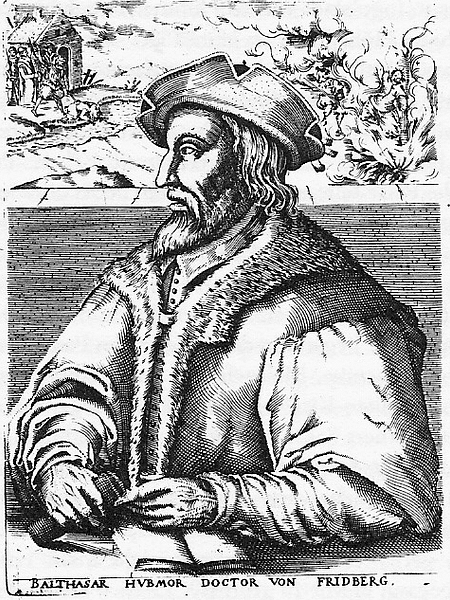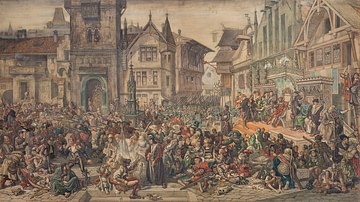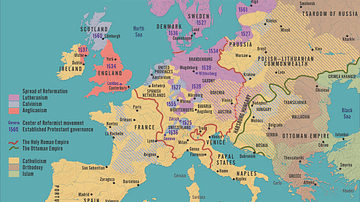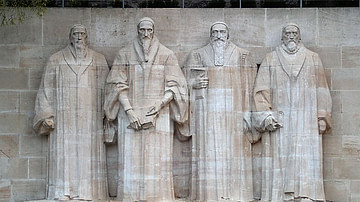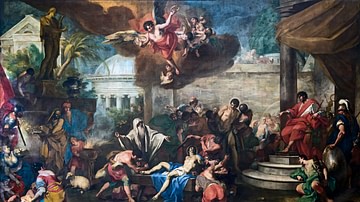Michael Sattler (l. 1490-1527) was a Roman Catholic monk who converted to the Anabaptist movement c. 1525 and contributed significantly to their Schleitheim Confession of faith. He is best known, however, for his trial and martyrdom in 1527, an event famously recorded in the 17th-century work Martyrs Mirror and still commemorated by modern-day Anabaptist sects.
Martyrs Mirror is a collection of stories of Anabaptist martyrs frequently compared with Foxe's Book of Martyrs but differing in its focus on Anabaptists who were marginalized by Foxe. The first comprehensive Martyrs Mirror was published by Hans de Ries (l. 1553-1638) in 1615 with later editions revised and published through 1632. Where the original account of Sattler's trial came from is unknown, but it has been claimed to have been recorded by a sympathetic witness to the event. This claim is challenged, however, as it seems more a matter of faith than historicity as is also the case with many of the accounts in Foxe's work.
The Anabaptists were only formed in 1525, and Sattler was already a prominent figure by 1526, leading the conference that wrote the Schleitheim Confession in February 1527. He was arrested, along with his wife Margaretha and others, in May 1527 and charged with eight counts of heresy. Although he defended himself and his co-defendants by citing the scriptural basis for their beliefs and actions, the court returned a guilty verdict, and all were executed.
Background & Arrest
The men who established the Anabaptist movement – Conrad Grebel (l. c. 1498-1526), Felix Manz (l. c. 1498-1527), and George Blaurock (l. c. 1491-1529) – were initially followers of the Swiss reformer Huldrych Zwingli (l. 1484-1531) in Zürich until Grebel and Manz (along with others) became disillusioned by what they interpreted as Zwingli's betrayal of the scripture. Zwingli claimed his reformed vision of Christianity was based entirely on the Bible but advocated violence in conversion efforts and the suppression of heresy, the validity of infant baptism, military service for Christians, and the payment of tithes to the Church, among other assertions.
Grebel, Manz, Wilhelm Reublin (l. 1484 to c. 1559), and others objected to Zwingli's vision on the grounds that the Bible supported none of these claims and a true Christian should reject them. Zwingli had taught that the Bible was the sole spiritual authority, and this was the point Grebel and the others agreed with him on: the Bible was the literal word of God, and one could not, therefore, pick and choose what one wanted to follow from its pages.
When the ten commandments in the Bible said, "Thou Shalt Not Kill" (Exodus 20:13), it meant precisely that, and there was no biblical justification for Christians killing anyone for any reason. When the Bible said, "Go ye therefore and teach all nations, baptizing them in the name of the Father, and of the Son, and of the Holy Ghost" (Matthew 28:19), it meant the adults of those nations, not infants who were incapable of making a commitment to Christ.
Tensions between Zwingli and his former followers increased after the Second Disputation of 1523 when they felt he had compromised himself on several important theological points and, according to Blaurock's Origin of the Anabaptists, in January 1525, he, Manz, and Grebel baptized each other into the new faith they called the Swiss Brethren and broke with Zwingli. Because they rejected infant baptism and practiced adult baptism, their detractors called them Anabaptists (rebaptizers). Zwingli's persecution of the Anabaptists began soon after as he encouraged the city council to pass laws against them and would eventually have four, including Manz, drowned before driving the others from Zürich.

Michael Sattler was a Benedictine monk in Germany who left his monastery during the chaos of the German Peasants' War (1524-1525) and, at about that same time, married Margaretha who had been part of the semi-monastic order of the Beguines. This suggests that Sattler was initially a Lutheran as Martin Luther (l. 1483-1546), an ex-monk, had encouraged other former Catholic clergy to marry. It is unclear when Sattler first became involved with the Anabaptists, but he was baptized into the faith in 1526, engaged in evangelism that same year in Rottenburg and the region of Horb am Neckar (said to have resulted in many converts), and presided over the Schleitheim conference in February 1527.
He and his wife, along with an undocumented number of others, were arrested in May 1527 and charged with eight counts of heresy:
- Denying the authority of the Holy Roman Emperor in religious matters
- Rejecting the presence of Christ in the Eucharist
- Rejecting the validity of infant baptism
- Rejecting the last rites of extreme unction
- Rejecting the Virgin Mary and the saints as intermediaries
- Rejecting the taking of oaths
- Rejecting celibacy of the clergy
- Advocating non-violence and non-resistance
According to the heresy laws, Sattler could have been executed for any one of the above without a trial, but, as he was so well-known, it was thought prudent to follow due process to avoid any accusations of injustice. Even so, the 24 judges who would decide Sattler's fate were Catholic theologians who rejected the Anabaptist movement as heretical and would not have been interested in whatever was offered by way of defense. The trial was held in Rottenburg am Neckar.
The Text
The following passage is taken from A Reformation Reader: Primary Texts with Introductions, edited by Denis R. Janz, pp. 212-214:
After many legal transactions on the day of his departure from this world, the articles against him being many, Michael Sattler requested that they might once more be read to him and that he might again be heard upon them. This the bailiff, as the attorney for the defense his lord [the emperor] opposed and would not consent to it. Michael Sattler then requested a ruling.
After a consultation, the judges returned as their answer that, if his opponents would allow it, they, the judges, would consent. Thereupon the town clerk of Ensisheim, as the spokesman for the said attorney, spoke thus:
"Prudent, honorable, and wise lords, he has boasted of the Holy Spirit. Now, if his boast is true, it seems to me, it is unnecessary to grant him this; for, if he has the Holy Spirit, as he boasts, the same will tell him what has been done here."
To this, Michael Sattler replied: "You servants of God, I hope my request will not be denied, for the said articles are as yet unclear to me because of their number."
The town clerk responded: "Prudent, honorable, and wise lords, though we are not bound to do this, yet in order to give satisfaction, we will grant him his request that it may not be thought that injustice is being done him in his heresy or that we desire to abridge him of his rights Hence, let the articles be read to him again" [The charges are all read to him and the other defendants.]
Thereupon, Michael Sattler requested permission to confer with his brethren and sisters, which was granted him. Having conferred with them for a little while, he began and undauntedly answered as follows:
"In regard to the articles relating to me and my brethren and sisters, hear this brief answer:
First: That we have acted contrary to the imperial mandate, we do not admit. For the same says that the Lutheran doctrine and delusion is not to be adhered to, but only the gospel and the Word of God. This we have kept. For I am not aware that we have acted contrary to the gospel and the Word of God. I appeal to the words of Christ.
Secondly: That the real body of Christ the lord is not present in the sacrament, we admit. For the Scripture says: Christ ascended into heaven and sitteth on the right hand of his heavenly Father, whence he shall come to judge the quick and the dead, from which it follows that, if he is in heaven and not in the bread, he may not be eaten bodily.
Thirdly: As to baptism, we say infant baptism is of no avail to salvation. For it is written [Romans 1:17] that we live by faith alone. Again [Mark 16:16]: He that believeth and is baptized shall be saved. Peter says the same [I Peter 3:21]: Which doth also now save you in baptism (which is signified by that ark of Noah), not the putting away of the filth of the flesh but rather the covenant of a good conscience with God by the resurrection of Jesus Christ.
Fourthly: We have not rejected the oil of extreme unction. For it is a creature of God and what God has made is good and not to be refused, but that the pope, bishops, monks, and priests can make it better we do not believe; for the pope never made anything good. That of which the Epistle of James speaks [5:14] is not the pope's oil.
Fifthly: We have not insulted the mother of God and the saints. For the mother of Christ is to be blessed among all women because unto her was accorded the favor of giving birth to the Savior of the whole world. But that she is a mediatrix and advocatess – of this the Scriptures know nothing, for she must with us await the judgment. Paul said to Timothy [I Timothy 2:5]: Christ is our mediator and advocate with God. As regards the saints, we say that we who live and believe are the saints, which I prove by the epistles of Paul to the Romans [1:7], the Corinthians [I Corinthians 1:2], the Ephesians [1:1], and other places where he always writes, "to the beloved saints." Hence, we who believe are the saints, but those who have died in the faith we regard as the blessed.
Sixthly: We hold that we are not to swear before the authorities, for the Lord says [Matthew 5:34]: Swear not, but let your communication be, Yea, yea; nay, nay.
Seventhly: When God called me to testify of his Word and I had read Paul and also considered the unchristian and perilous state in which I was, beholding the pomp, pride, usury, and great whoredom of the monks and priests, I went and took unto me a wife, according to the command of God; for Paul well prophesies concerning this to Timothy [I Timothy 4:3]: In the latter time it shall come to pass that men shall forbid to marry and command to abstain from meats which God hath created to be received with thanksgiving.
Eighthly: If the Turks should come, we ought not to resist them. For it is written [Matthew 5:21]: Thou shalt not kill. We must not defend ourselves against the Turks and others of our persecutors but are to beseech God with earnest prayer to repel and resist them. But that I said that, if warring were right, I would rather take the field against so-called Christians who persecute, capture, and kill pious Christians than against the Turks was for the following reason: The Turk is a true Turk, knows nothing of the Christian faith, and is a Turk after the flesh. But you who would be Christians and who make your boast of Christ persecute the pious witnesses of Christ and are Turks after the spirit!
In conclusion, ministers of God, I admonish you to consider the end for which God has appointed you, to punish the evil and to defend and protect the pious. Whereas then, we have not acted contrary to God and the gospel, you will find that neither I nor my brethren and sisters have offended in word or deed against any authority. Therefore, ministers of God, if you have neither heard nor read the Word of God, send for the most learned men and for the sacred books of the Bible in whatsoever language they may be and let them confer with us in the Word of God. If they prove to us with the Holy Scriptures that we err and are in the wrong, we will gladly desist and recant and also willingly suffer the sentence and punishment for that of which we have been accused; but if no error is proven to us, I hope to God that you will be converted and receive instruction."
Upon this speech the judges laughed and put their heads together, and the town clerk of Ensisheim said: "Yes, you infamous, desperate, rascal of a monk - should we dispute with you? The hangman will dispute with you, I assure you!"
Michael said: "God's will be done."
The town clerk said: "It were well if you had never been born."
Michael replied: "God knows what is good."
The town clerk: "You arch heretic, you have seduced pious people. If they would only now forsake their error and commit themselves to grace!"
Michael: "Grace is with God alone."
One of the prisoners also said: "We must not depart from the truth."
The town clerk: "Yes, you desperate villain, you arch heretic, I say, if there were no hangman here, I would hang you myself and be doing God a service thereby."
Michael: "God will judge aright." Thereupon the town clerk said a few words to him in Latin, what, we do not know.
The town clerk then admonished the judges and said: "He will not cease from this chatter anyway. Therefore, my Lord Judge, you may proceed with the sentence. I call for a decision of the court."
The judge asked Michael Sattler whether he too committed it to the court. He replied:
"Ministers of God, I am not sent to judge the Word of God. We are sent to testify and hence cannot consent to any adjudication, since we have no command from God concerning it. But we are not for that reason removed from being judged and we are ready to suffer and to await what God is planning to do with us. We will continue in our faith in Christ so long as we have breath in us unless we be dissuaded from it by the Scriptures."
The town clerk said: "The hangman will instruct you; he will dispute with you, arch heretic."
Michael: "I appeal to the Scriptures."
Then the judges arose and went into another room where they remained for an hour and a half and determined the sentence. In the meantime, some of the soldiers in the room treated Michael Sattler most unmercifully, heaping reproach upon him. One of them said: "What have you in prospect for yourself and the others that you have so seduced them?" With this he also drew a sword which lay upon the table, saying, "See, with this they will dispute with you." But Michael did not answer upon a single word concerning himself but willingly endured it all. One of the prisoners said: "We must not cast pearls before swine."
Being also asked why he had not remained a lord in the convent, Michael answered: "According to the flesh I was a lord, but it is better as it is." He did not say more than what is recorded here, and this he spoke fearlessly.
The judges having returned to the room, the sentence was read. It was as follows:
"In the case of the attorney of His Imperial Majesty vs. Michael Sattler, judgment is passed that Michael Sattler shall be delivered to the executioner, who shall lead him to the place of execution and cut out his tongue, then forge him fast to a wagon and thereon with red hot tongs twice tear pieces from his body; and after he has been brought outside the gate, he shall be plied five times more in the same manner."
After this had been done in the manner prescribed, he was burned to ashes as a heretic. His fellow brethren were executed with the sword and the sisters were drowned. His wife, also after being subjected to many entreaties, admonitions, and threats, under which she remained steadfast, was drowned a few days afterward. Done the 21st day of May, A.D. 1527.
Conclusion
Sattler's execution (which took place on 20 May 1527) is thought to have been especially brutal owing to his prominence in the movement as a powerful public speaker. Felix Manz was executed by drowning in 1527, George Blaurock was burned at the stake in 1529, and this was the usual method of dispensing with heretics, especially the Anabaptists. Balthasar Hubmaier (l. 1480-1528), another prominent Anabaptist, was also burned at the stake and his wife drowned, the preferred method of executing women even though many female Anabaptists were also burned.
Hubmaier's Concerning Heretics and Those Who Burn Them (1524) argued that only God could judge who was or was not a 'heretic' and suspected heretics should be admonished and then left alone. His arguments were ignored as was the clear precedent that persecution of any dissenting demographic tended to draw greater support for it. The Anabaptists were hated and persecuted by both Catholics and Protestants as they rejected both systems, claiming neither adhered to the Bible, but these persecutions – and the examples of martyrs like Sattler – only encouraged the sect's growth. In the present day, the Amish, Bruderhof, Mennonites, and similar sects all descend from the Anabaptist movement, which, in spite of the harshest persecutions, endured.

